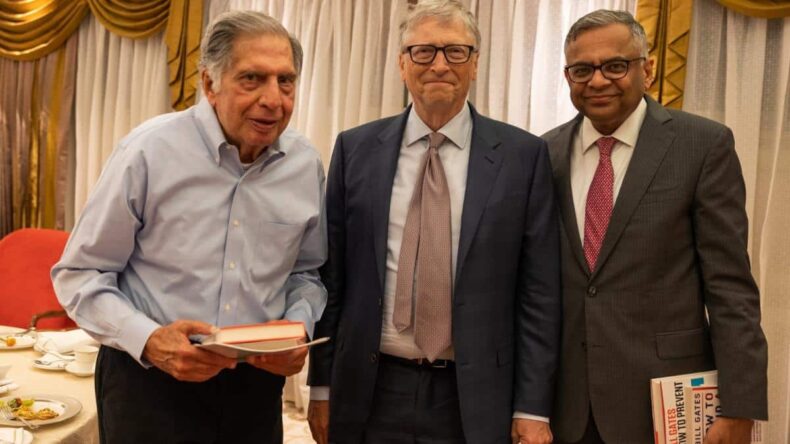Table of Contents
Bill stated this while delivering the Fifth Ramnath Goenka Memorial Lecture here that India has the capacity to grow into a centre of “innovation and creativity,” to usher in a “new age of global partnership” which may address the world’s greatest issues.

According to Bill Gates, who added that the Covid epidemic “catalysed” a wave of health innovation in India, the first 25 weeks of the outbreak ruined 25 years’ worth of progress in world health, and three years later, most countries’ health systems are still not fully back on track.
Gates stated this while delivering the Fifth Ramnath Goenka Memorial Lecture here. India has the ability to grow into a centre of “innovation and invention,” to usher in a “new age of global collaboration,” which may address the world’s greatest difficulties. This is due to its history of vaccine creation and its digital public infrastructure platform.
India: Originator of New Discoveries
In order to highlight the ability of innovation to close gaps and India’s contribution to the “great, global innovation boom,” Gates said: “In 1998, when I was at Microsoft, we decided to open a development centre here. And we took that action because we were aware that India will play a significant role in the global innovation ecosystem, not just as a recipient of new discoveries but also as an originator of them. Also, as a scaler of innovations. India can create technologies that are both high-quality and reasonably priced and accelerate their uptake. A good example is vaccinations.
Significant Role of India in Climate Change
India has a significant role to play in tackling the world’s biggest problems, such as climate change and healthcare, according to Gates, who highlighted the nation’s low-cost innovations like the rotavirus vaccine that saved lives all over the world and affordable solutions like creating biofuels and fertilisers from waste to combat climate change.

The co-chair and trustee of the Bill and Melinda Gates Foundation as well as an author, philanthropist, investor, and founder of a technology company opened his lecture by discussing a front-page article in The New York Times about the 3 million children who die of diarrhoea every year, 90% of whom are from developing nations. Diarrhea was not on his list of worries for his newborn daughter, he claimed. He described how India advanced from that point to one where 83% of the nation’s one-year-olds now receive the rotavirus vaccine, preventing 200,000 deaths annually.
While childhood immunisation rates in India were returning to pre-pandemic levels, according to Gates, it might take another three years for many other nations to catch up. He discussed developments at COVID-19 and India’s capacity to produce more affordable testing kits.
Strong Digital Infrastructure
William Gates, co-founder of Microsoft and co-chair of the Bill and Melinda Gates Foundation, lauded India for developing a strong digital infrastructure.
India has done more than any other nation to create a comprehensive platform, according to Gates, who was speaking in New Delhi at a G20 discussion on the promise of digital public infrastructure for building resilient and inclusive economies.

He spoke to the crowd in the presence of Ashwini Vaishnaw, India’s Minister of Electronics and Information Technology, and claimed that the country’s efforts to provide digital identity were what allowed it to offer services like finance.
He emphasised that it would have taken 50 years for India to have as many bank accounts as it does today if there had been no digital infrastructure. The Gates Foundation is able to pay field employees thanks to digital payment infrastructure, facilitating the adoption of innovation across industries, including agriculture, he added.
According to Bill Gates, when he worked at Microsoft, they decided to locate a development centre there. “And we took that action because we were aware that India will play a significant role in the global innovation ecosystem, not just as a recipient of new discoveries but also as an originator of them. Also, as a scaler of innovations. India can create technologies that are both high-quality and reasonably priced and accelerate their uptake. A good example is vaccinations.
He continued, “India is leading the way in displaying all sorts of novel uses.
Additionally, Gates pointed out that India’s aspirational renewable energy targets have the ability to alter the nation’s energy system and combat climate change.
Bill Gates stated this in reference to the Indian Agricultural Research Institute, or IARI, in Pusa, India: “For the purpose of assisting the research being done at IARI, the Gates Foundation collaborated with the Indian public sector and CGIAR institutions. They discovered a brand-new remedy in chickpea cultivars with over 10% higher yields and more drought resistance. One kind is already available to farmers, and the institution is actively striving to produce additional. India is consequently better prepared to keep feeding its people and supporting its farmers even as the world warms. It’s not a stretch to suggest that a field in Pusa is currently home to the agricultural future of India.”













